Charles E W Bean, Diaries, AWM38 3DRL 606/246/1 - 1916 - 1929 - Part 9
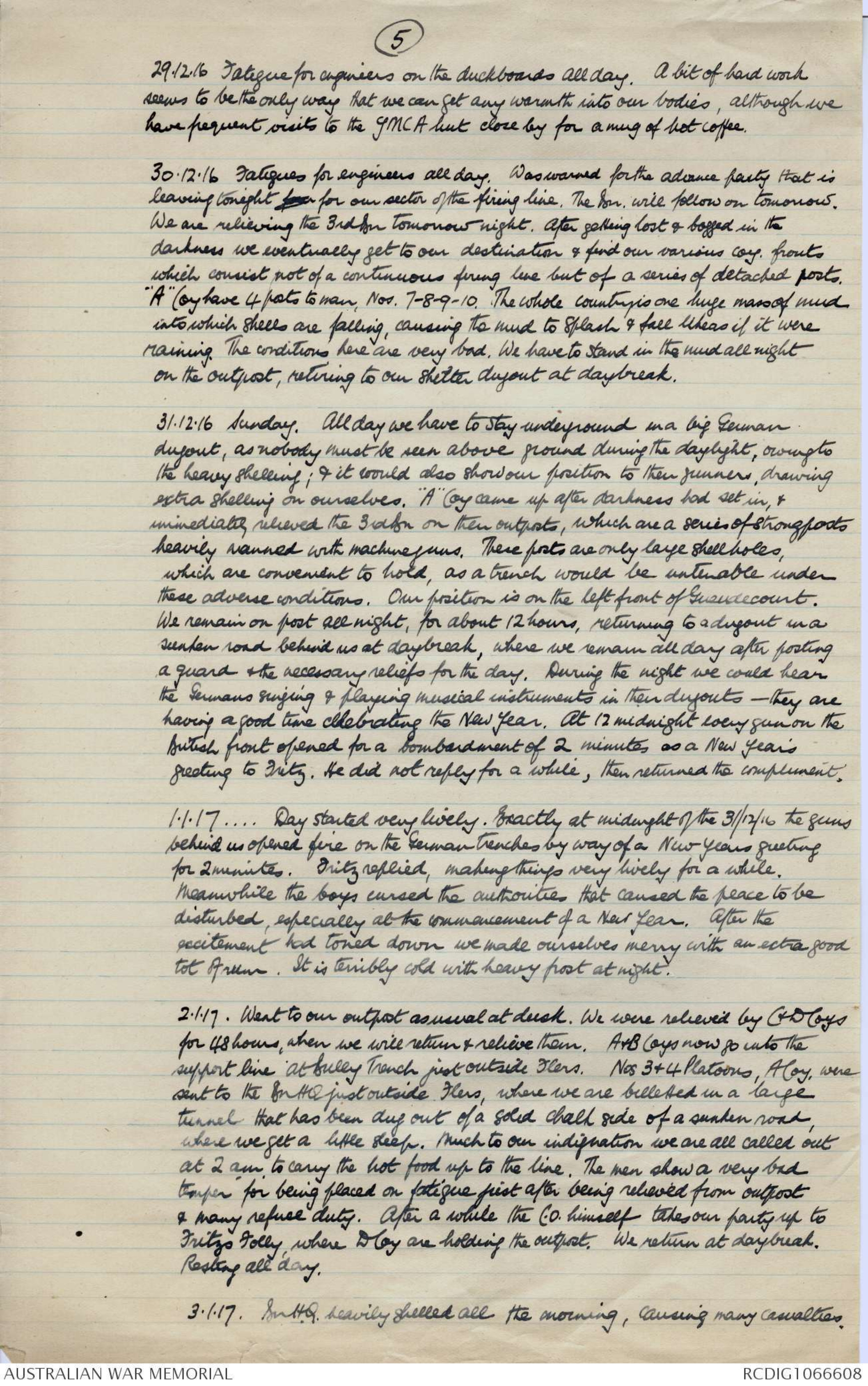
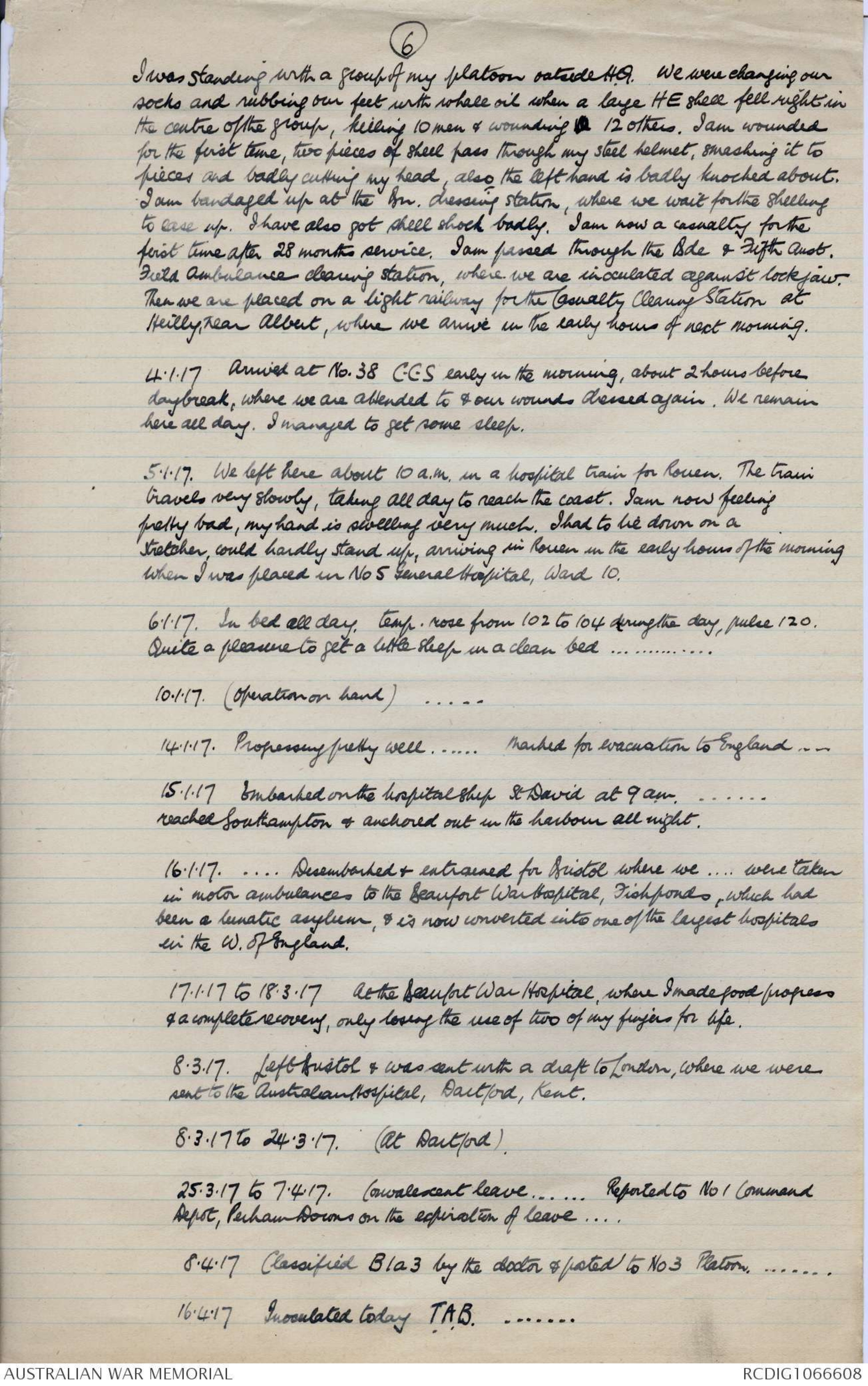
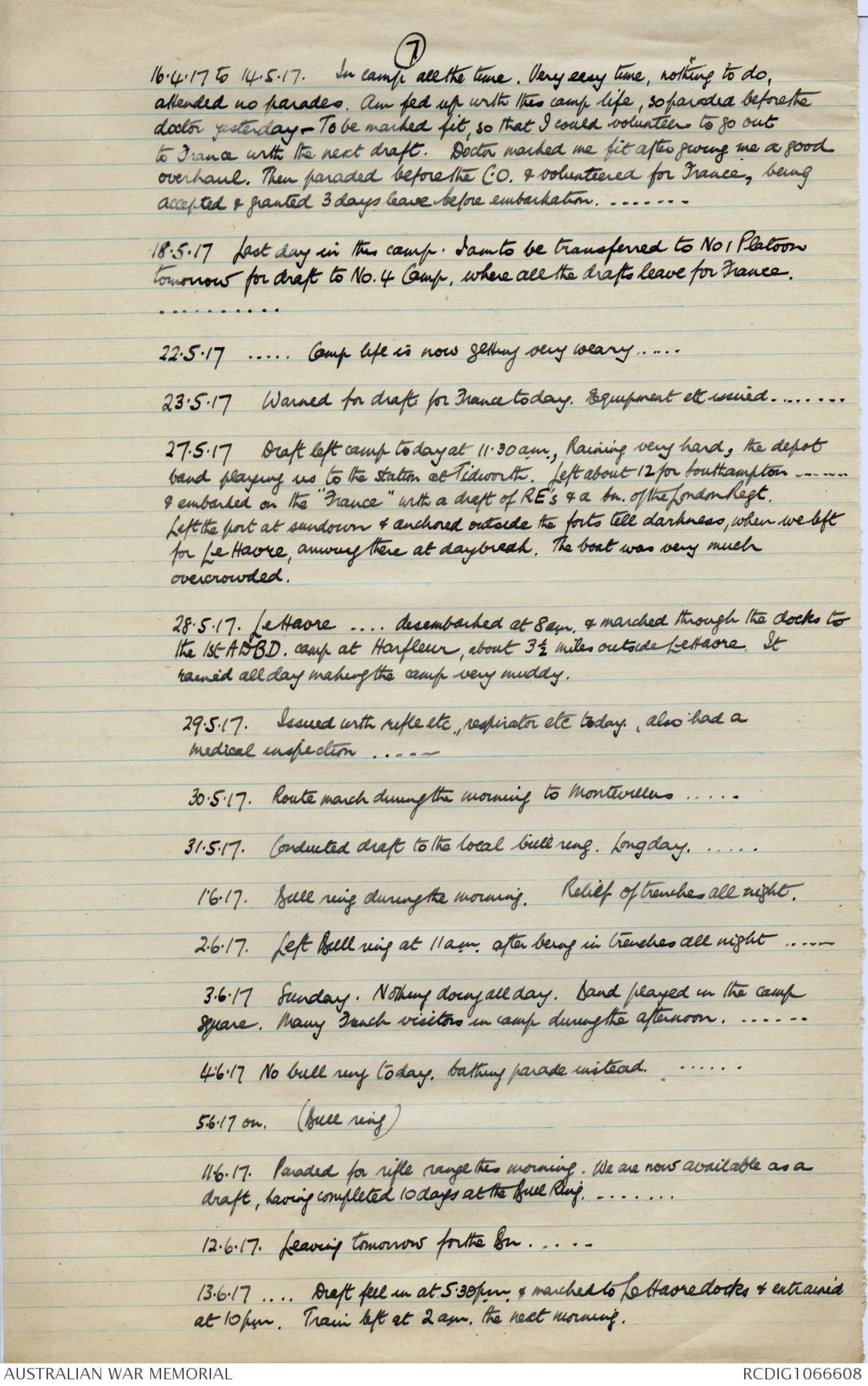
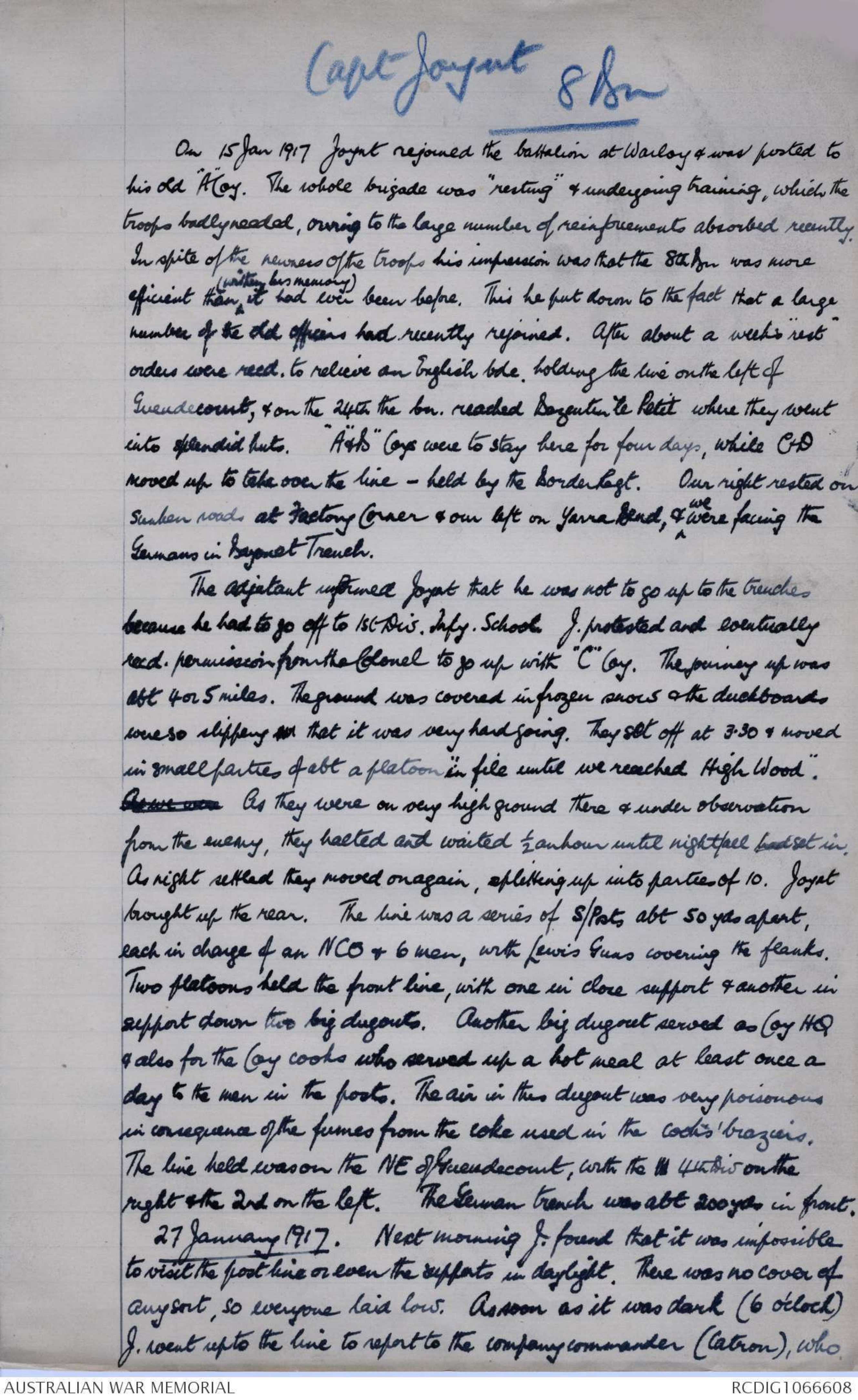
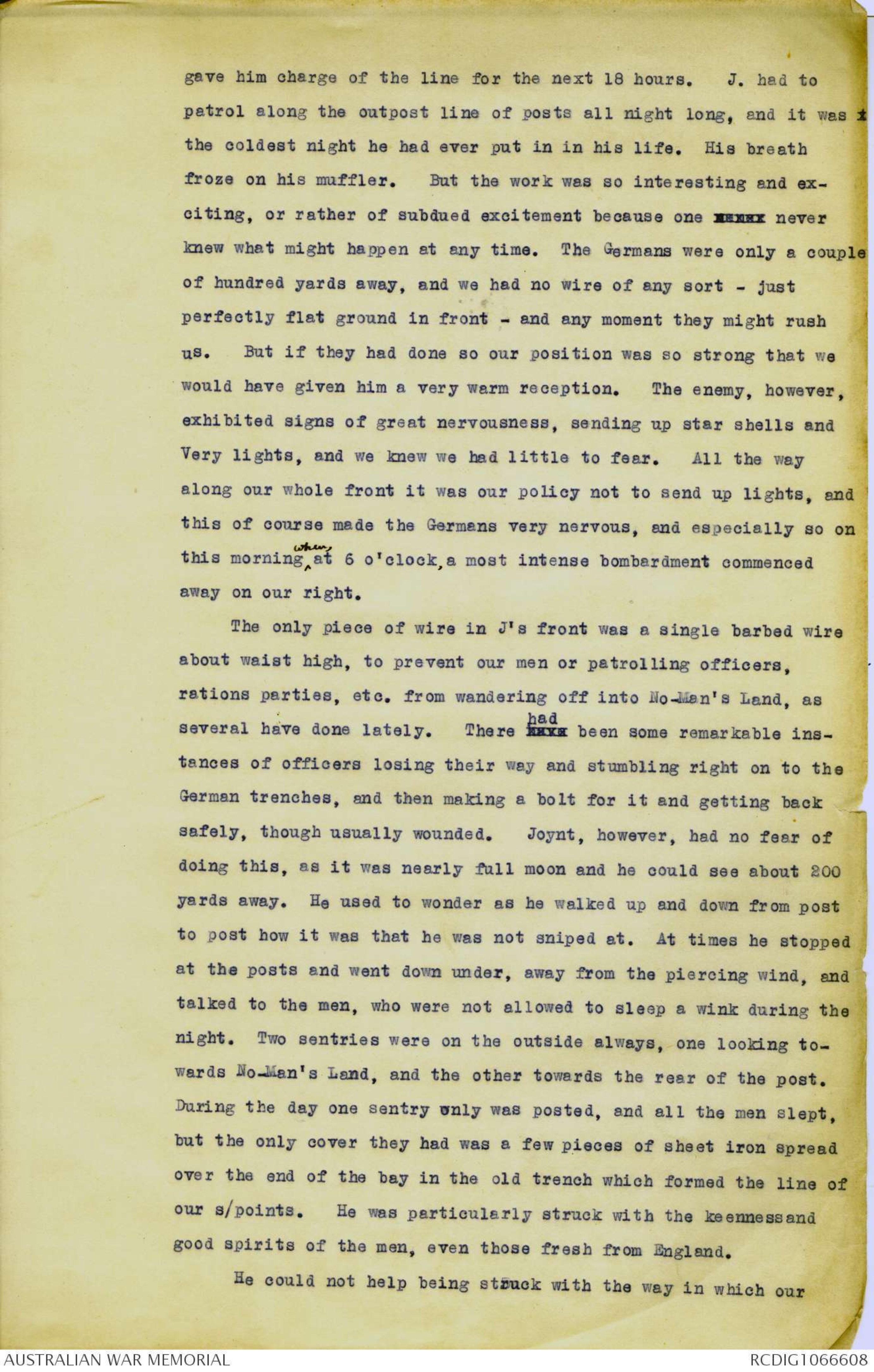
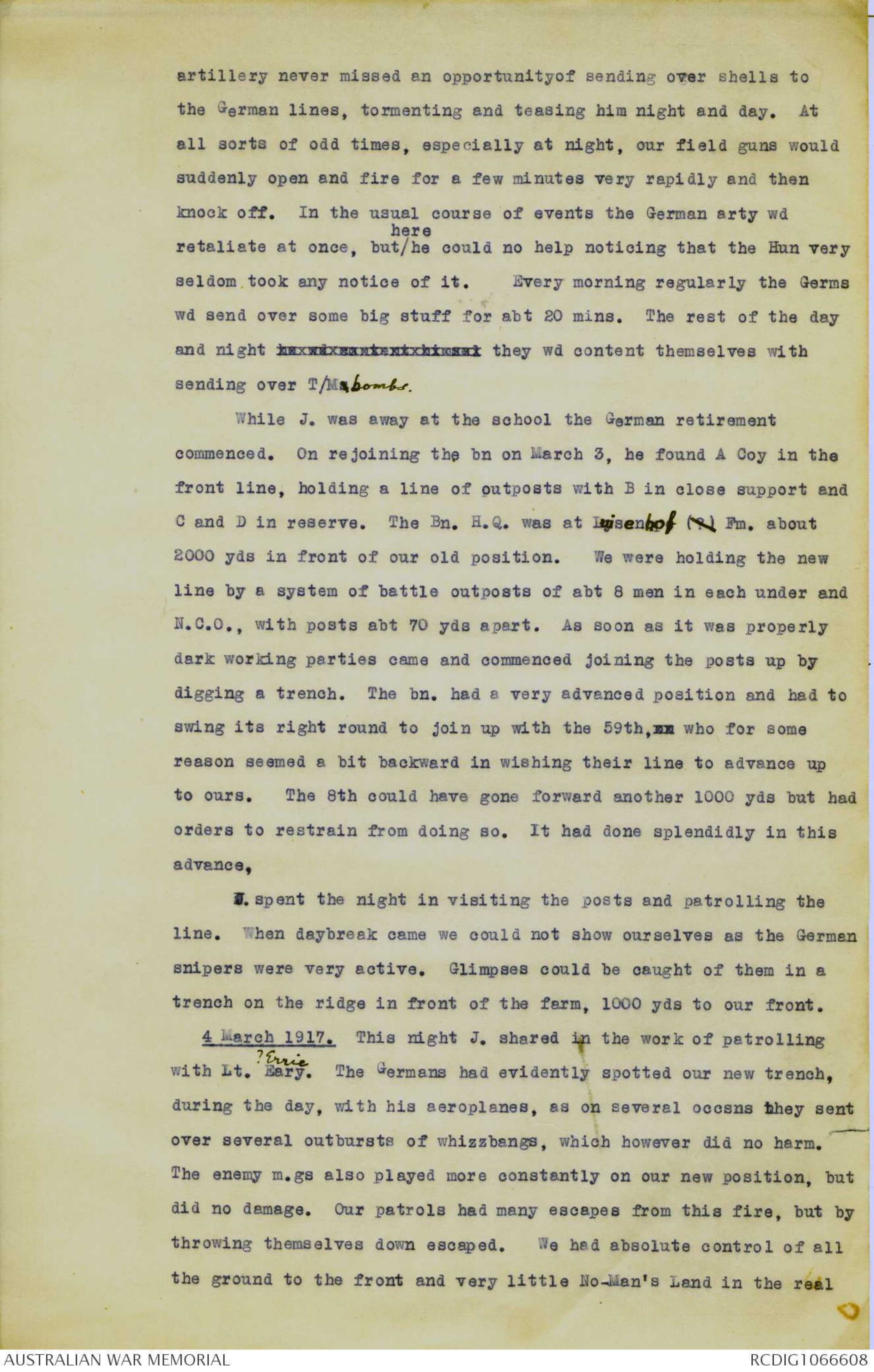
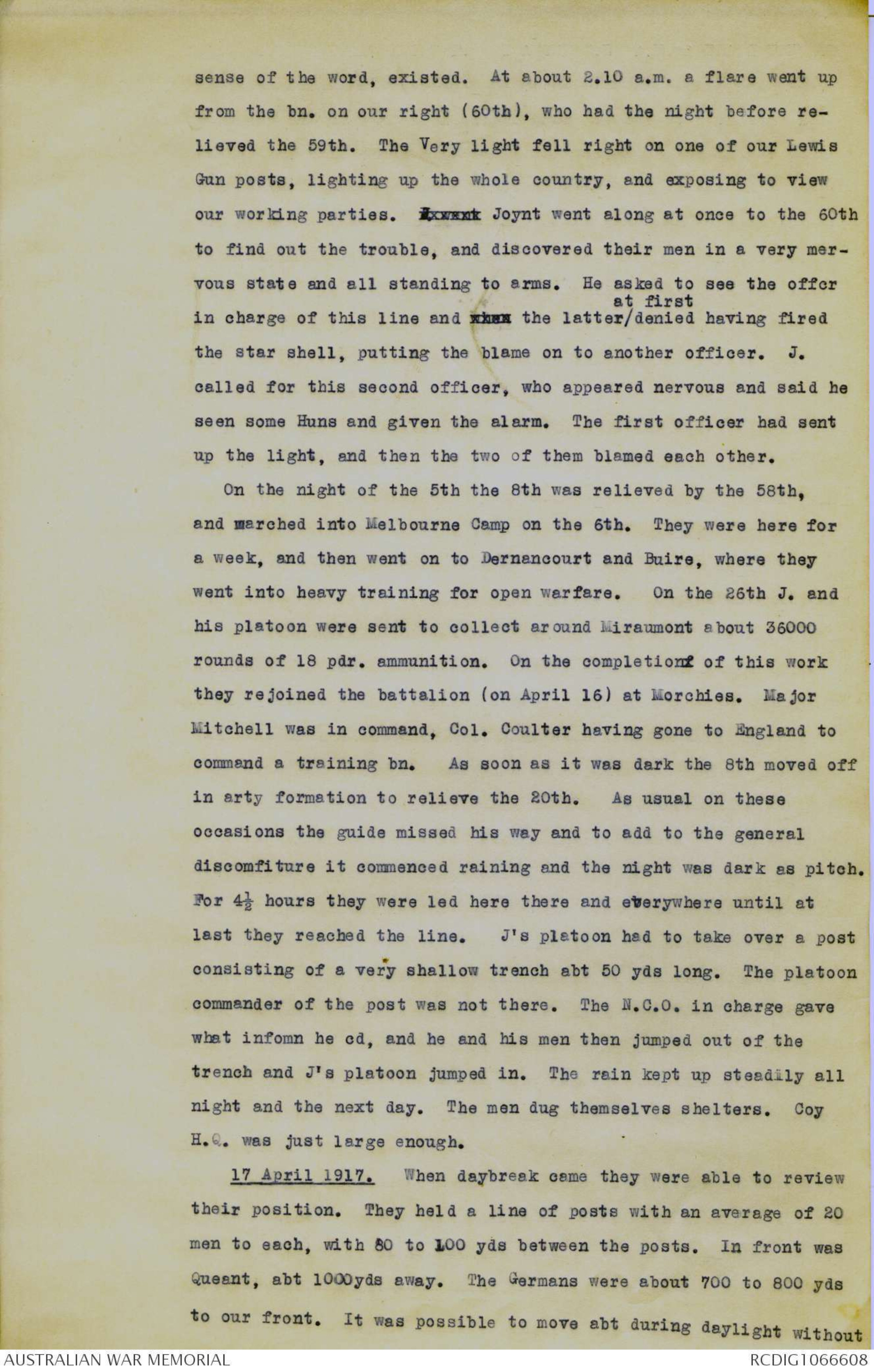
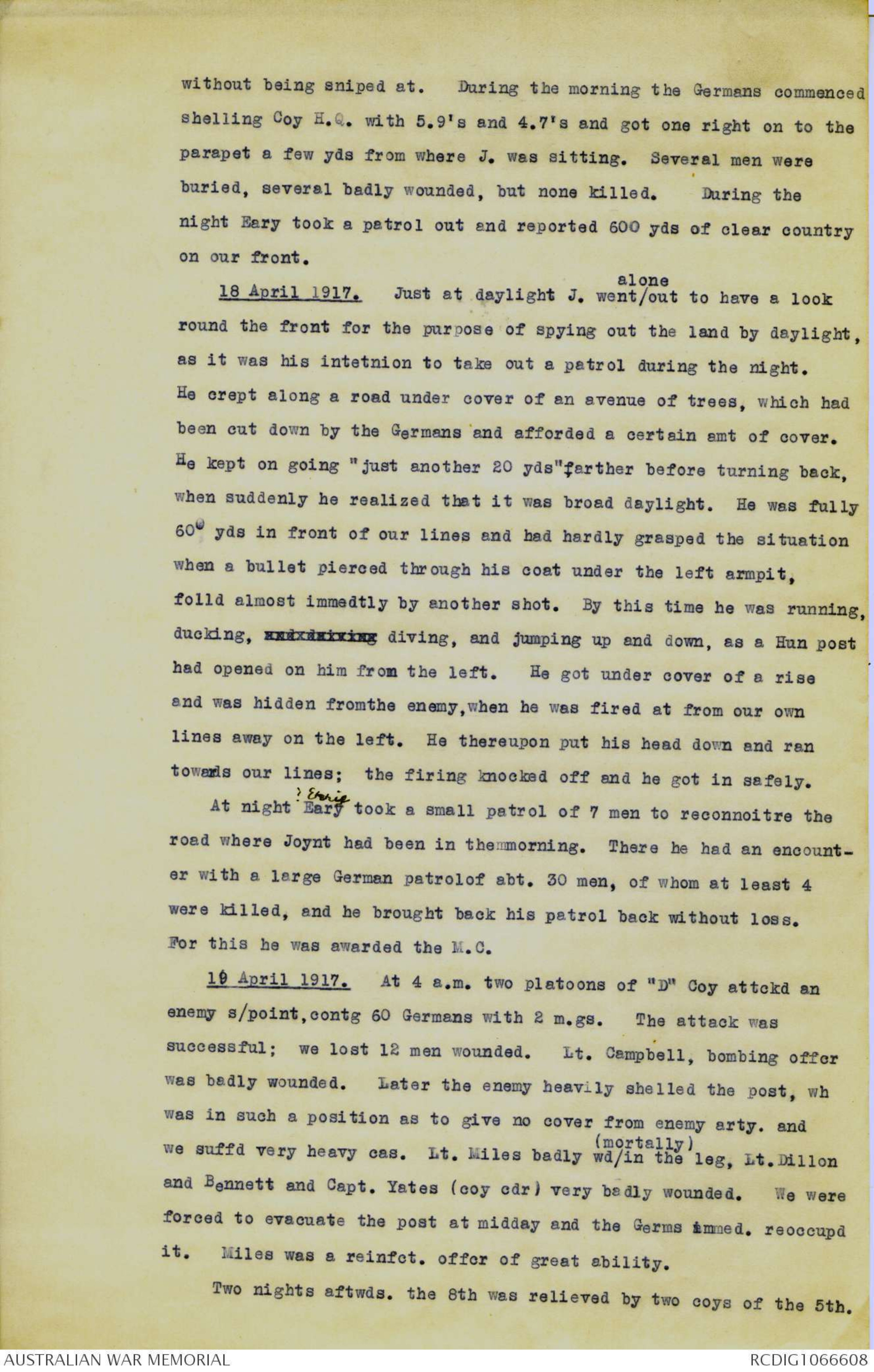
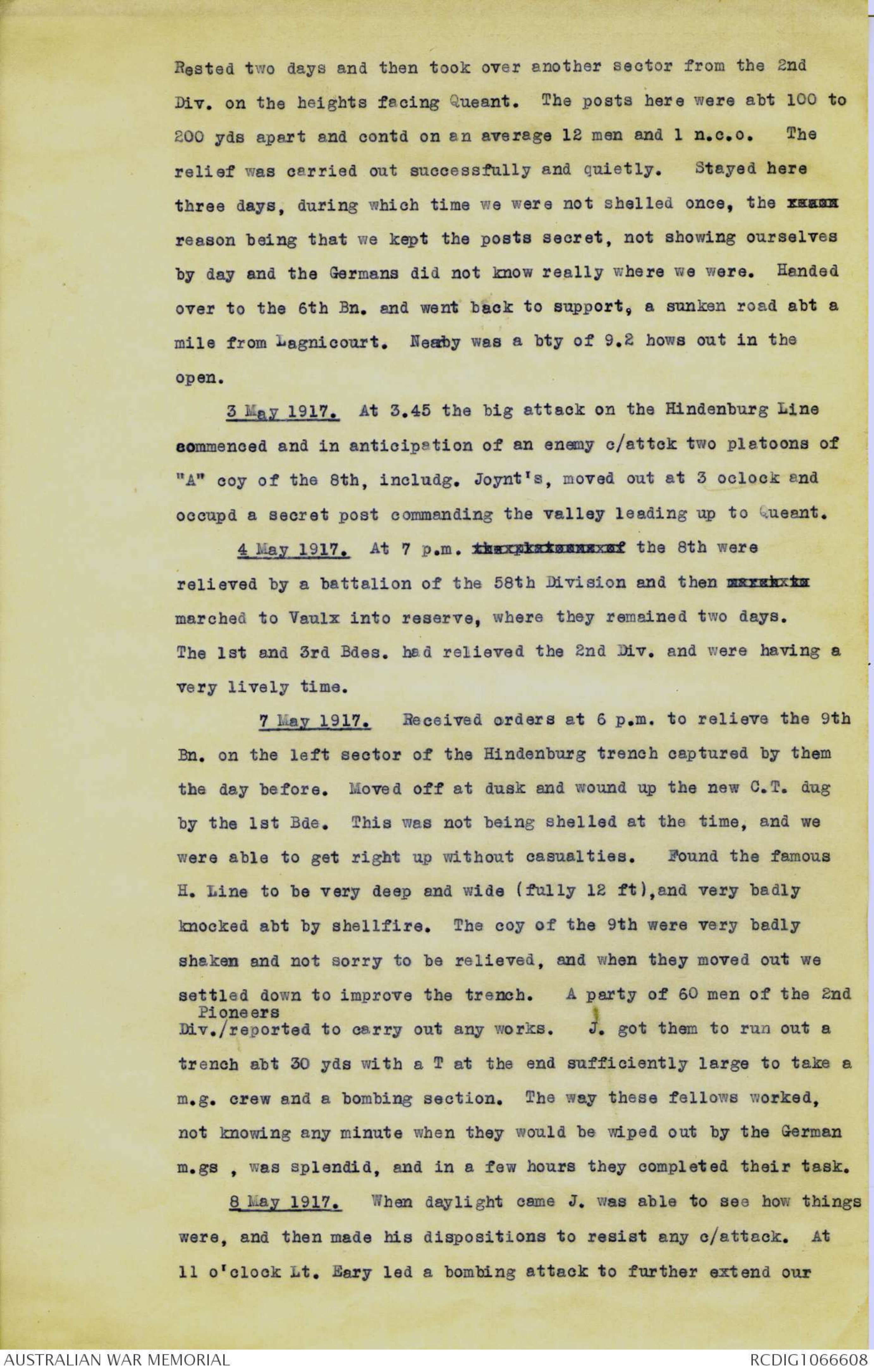
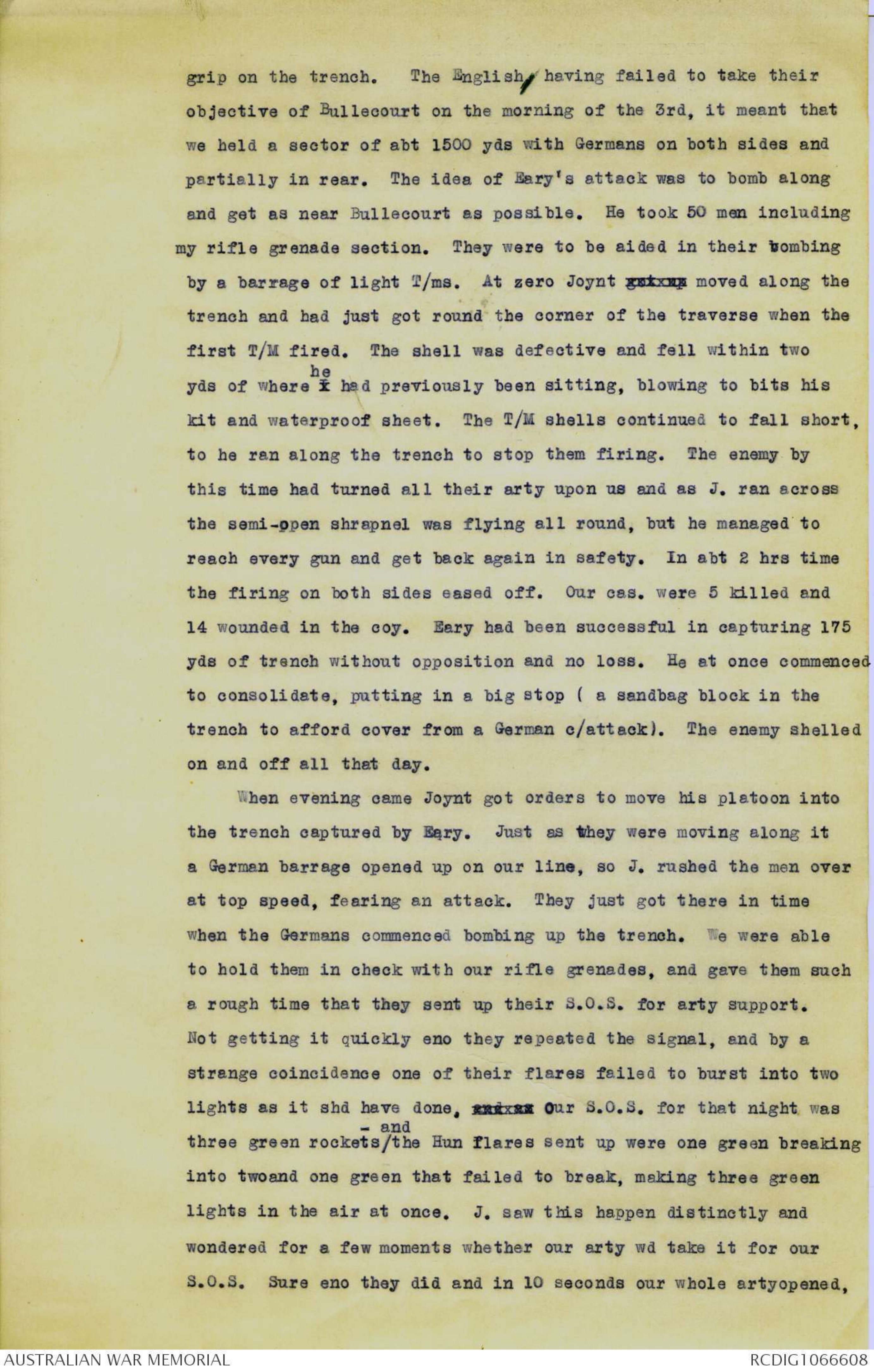
(5)
29.12.16 Fatigue for engineers on the duckboards all day. A bit of hard work
seems to be the only way that we can get any warmth into our bodies, although we
have frequent visits to the YMCA hut close by for a mug of hot coffee.
30.12.16 Fatigues for engineers all day. Was warned for the advance party that is
leaving tonight fxx for our sector of the firing line. The Bn. will follow on tomorrow.
We are relieving the 3rd Bn tomorrow night. After getting lost & bogged in the
darkness we eventually get to our destination & find our various coy. fronts
which consist not of a continuous firing line but of a series of detached posts.
"A" Coy have 4 posts to man, Nos. 7-8-9-10. The whole country is one huge mass of mud
into which shells are falling, causing the mud to splash & fall like as if it were
raining. The conditions here are very bad. We have to stand in the mud all night
on the outpost, retiring to our shelter dugout at daybreak.
31.12.16 Sunday. All day we have to stay underground in a big German
dugout, as nobody must be seen above ground during the daylight, owing to
the heavy shelling; & it would also show our position to their gunners, drawing
extra shelling on ourselves. "A" Coy came up after darkness had set in, &
immediately relieved the 3rd Bn on their outposts, which are a series of strongposts
heavily manned with machine guns. These posts are only large shellholes,
which are convenient to hold, as a trench would be untenable under
these adverse conditions. Our position is on the left front of Gueudecourt.
We remain on post all night, for about 12 hours, returning to a dugout in a
sunken road behind us at daybreak, where we remain all day after posting
a guard & the necessary reliefs for the day. During the night we could hear
the Germans singing & playing musical instruments in their dugouts - they are
having a good time celebrating the New Year. At 12 midnight every gun on the
British front opened for a bombardment of 2 minutes as a New Year's
greeting to Fritz. He did not reply for a while, then returned the compliment.
1.1.17. . . . Day started very lively. Exactly at midnight of the 31/12/16 the guns
behind us opened fire on the German trenches by way of a New Years greeting
for 2 minutes. Fritz replied, making things very lively for a while.
Meanwhile the boys cursed the authorities that caused the peace to be
disturbed, especially at the commencement of a New Year. After the
excitement had toned down we made ourselves merry with an extra good
tot of rum. It is terribly cold with heavy frost at night.
2.1.17. Went to our outpost as usual at dusk. We were relieved by C & D Coys
for 48 hours, when we will return & relieve them. A & B Coys now go into the
support line at Bully Trench just outside Flers. Nos 3 & 4 Platoons, A Coy, were
sent to the Bn HQ just outside Flers, where we are billetted in a large
tunnel that has been dug out of a solid chalk side of a sunken road,
where we get a little sleep. Much to our indignation we are all called out
at 2 a.m. to carry the hot food up to the line. The men show a very bad
temper for being placed on fatigue just after being relieved from outpost
& many refuse duty. After a while the C.O. himself takes our party up to
Fritzs Folly, where D Coy are holding the outpost. We return at daybreak.
Resting all day.
3.1.17. Bn H.Q. heavily shelled all the morning, causing many casualties.
(6)
I was standing with a group of my platoon outside H.Q. We were changing our
socks and rubbing our feet with whale oil when a large HE shell fell right in
the centre of the group, killing 10 men & wounding 10 12 others. I am wounded
for the first time, two pieces of shell pass through my steel helmet, smashing it to
pieces and badly cutting my head, also the left hand is badly knocked about.
I am bandaged up at the Bn. dressing station, where we wait for the shelling
to ease up. I have also got shell shock badly. I am now a casualty for the
first time after 28 months service. I am passed through the Bde & Fifth Aust.
Field Ambulance clearing station, where we are inoculated against lockjaw.
Then we are placed on a light railway for the Casualty Clearing Station at
Heilly, near Albert, where we arrive in the early hours of next morning.
4.1.17 Arrived at No. 38 C.C.S early in the morning, about 2 hours before
daybreak, where we are attended to & our wounds dressed again. We remain
here all day. I managed to get some sleep.
5.1.17. We left here about 10 a.m. in a hospital train for Rouen. The train
travels very slowly, taking all day to reach the coast. I am now feeling
pretty bad, my hand is swelling very much. I had to lie down on a
stretcher, could hardly stand up, arriving in Rouen in the early hours of the morning
when I was placed in No 5 General Hospital, Ward 10.
6.1.17. In bed all day. temp. rose from 102 to 104 during the day, pulse 120.
Quite a pleasure to get a little sleep in a clean bed ... ..........
10.1.17. (Operation on hand) .....
14.1.17. Progressing pretty well ...... Marked for evacuation to England ....
15.1.17 Embarked on the hospital ship St David at 9 a.m. ......
reached Southampton & anchored out in the harbour all night.
16.1.17. .... Disembarked & entrained for Bristol where we .... were taken
in motor ambulances to the Beaufort War Hospital, Fishponds, which had
been a Lunatic asylum, & is now converted into one of the largest hospitals
in the W. of England.
17.1.17 to 18.3.17 At the Beaufort War Hospital, where I made good progress
& a complete recovery, only losing the use of two of my fingers for life.
8.3.17. Left Bristol & was sent with a draft to London, where we were
sent to the Australian Hospital, Dartford, Kent.
8.3.17 to 24.3.17. (At Dartford).
25/3/17 to 7.4.17. Convalescent leave ...... Reported to No 1 Command
Depot, Perham Downs on the expiration of leave ....
8.4.17 Classified B1a3 by the doctor & posted to No 3 Platoon. .......
16.4.17 Inoculated today T.A.B. ......
(7)
16.4.17 to 14.5.17. In camp all the time. Very easy time, nothing to do,
attended no parades. Am fed up with this camp life, so paraded before the
doctor yesterday - To be marked fit, so that I could volunteer to go out
to France with the next draft. Doctor marked me fit after giving me a good
overhaul. Then paraded before the C.O. & volunteered for France, being
accepted & granted 3 days leave before embarkation. .......
18.5.17 Last day in this camp. I am to be transferred to No 1 Platoon
tomorrow for draft to No. 4 Camp, where all the drafts leave for France.
..........
22.5.17 ..... Camp life is now getting very weary ......
23.5.17 Warned for draft for France today. Equipment etc issued .......
27.5.17 Draft left camp today at 11.30a.m., Raining very hard, the depot
band playing us to the station at Tidworth. Left about 12 for Southampton ......
& embarked on the "France" with a draft of RE's & a bn. of the London Regt.
Left the port at sundown & anchored outside the forts till darkness, when we left
for Le Havre, arriving there at daybreak. The boat was very much
overcrowded.
28.5.17. Le Havre .... desembarked at 8 a.m. & marched through the docks to
the 1st ADBD. camp at Harfleur, about 3½ miles outside Le Havre. It
rained all day making the camp very muddy.
29.5.17. Issued with rifle etc., respirator etc today, also had a
medical inspection ......
30.5.17. Route march during the morning to Montevillers ....
31.5.17. Conducted draft to the local bull ring. Long day. ....
1.6.17. Bull ring during the morning. Relief of trenches all night.
2.6.17. Left Bull ring at 11 a.m. after being in trenches all night ......
3.6.17 Sunday. Nothing doing all day. Band played in the camp
square. Many French visitors in camp during the afternoon. ......
4.6.17 No bull ring today. bathing parade instead ......
5.6.17 on. (Bull ring)
11.6.17. Paraded for rifle range this morning. We are now available as a
draft, having completed 10 days at the Bull Ring. .......
12.6.17. Leaving tomorrow for the Bn .....
13.6.17 .... Draft fell in at 5.30p.m. & marched to Le Havre docks & entrained
at 10 p.m. Train left at 2 a.m. the next morning.
[*Capt Joynt 8 Bn*]
On 15 Jan 1917 Joynt rejoined the battalion at Warloy & was posted to
his old "A" Coy. The whole brigade was "resting" & undergoing training, which the
troops badly needed, owing to the large number of reinforcements absorbed recently.
In spite of the newness of the troops his impression was that the 8th Bn was more
efficient than ^(within his memory) it had ever been before. This he put down to the fact that a large
number of the old officers had recently rejoined. After about a week's "rest"
orders were recd. to relieve an English bde. holding the line on the left of
Gueudecourt, & on the 24th the bn. reached Bazentin Le Petit where they went
into splendid huts. "A" & "B" Coys were to stay here for four days, while C & D
moved up to take over the line - held by the Border Regt. Our right rested on
Sunken roads at Factory Corner & our left on Yarra Bend, & ^we were facing the
Germans in Bayonet Trench.
The Adjutant informed Joynt that he was not to go up to the trenches
because he had to go off to 1st Div. Infy. School J. protested and eventually
recd. permission from the Colonel to go up with "C" Coy. The journey up was
abt 4 or 5 miles. The ground was covered in frozen snow & the duckboards
were so slippery xx that it was very hard going. The set off at 3.30 & moved
in small parties of abt a platoon "in file until we reached High Wood".As we xxx As they were on very high ground there & under observation
from the enemy, they halted and waited ½ anhour until nightfall had set in.
As night settled they moved on again, splitting up into parties of 10. Joynt
brought up the rear. The line was a series of S/Posts abt 50 yds apart,
each in charge of an NCO & 6 men, with Lewis Guns covering the flanks.
Two platoons held the front line, with one in close support & another in
support down two big dugouts. Another big dugout served as Coy HQ
& also for the Coy cooks who served up a hot meal at least once a
day to the men in the posts. The air in this dugout was very poisonous
in consequence of the fumes from the coke used in the Cooks' braziers.
The line held was on the NE of Gueudecourt, with the xx 4th Div on the
right & the 2nd on the left. The German trench was abt 200 yds in front.
27 January 1917. Next morning J. found that it was impossible
to visit the front line or even the supports in daylight. There was no cover of
any sort, so everyone laid low. As soon as it was dark (6 o'clock)
J. went up to the line to report to the company commander (Catron), who
gave him charge of the line for the next 18 hours. J. had to
patrol along the outpost line of posts all night long, and it was x
the coldest night he had ever put in in his life. His breath
froze on his muffler. But the work was so interesting and
exciting, or rather of subdued excitement because one xxxxx never
knew what might happen at any time. The Germans were only a couple
of hundred yards away, and we had no wire of any sort - just
perfectly flat ground in front - and any moment they might rush
us. But if they had done so our position was so strong that we
would have given him a very warm reception. The enemy, however,
exhibited signs of great nervousness, sending up star shells and
Very lights, and we knew we had little to fear. All the way
along our whole front it was our policy not to send up lights, and
this of course made the Germans very nervous, and especially so on
this morning ^when, at 6 o'clock, a most intense bombardment commenced
away on our right.
The only piece of wire in J's front was a single barbed wire
about waist high, to prevent our men or patrolling officers,
rations parties, etc. from wandering off into No-Man's Land, as
several have done lately. There have had been some remarkable
instances of officers losing their way and stumbling right on to the
German trenches, and then making a bolt for it and getting back
safely, though usually wounded. Joynt, however, had no fear of
doing this, as it was nearly full moon and he could see about 200
yards away. He used to wonder as he walked up and down from post
to post how it was that he was not sniped at. At times he stopped
at the posts and went down under, away from the piercing wind, and
talked to the men, who were not allowed to sleep a wink during the
night. Two sentries were on the outside always, one looking towards
No-Man's Land, and the other towards the rear of the post.
During the day one sentry only was posted, and all the men slept,
but the only cover they had was a few pieces of sheet iron spread
over the end of the bay in the old trench which formed the line of
our s/points. He was particularly struck with the keenness and
good spirits of the men, even those fresh from England.
He could not help being struck with the way in which our
artillery never missed an opportunityof sending over shells to
the German lines, tormenting and teasing him night and day. At
all sorts of odd times, especially at night, our field guns would
suddenly open and fire for a few minutes very rapidly and then
knock off. In the usual course of events the German arty wd
retaliate at once, but ^here he could no help noticing that the Hun very
seldom took any notice of it. Every morning regularly the Germs
wd send over some big stuff for abt 20 mins. The rest of the day
and night xx xx xxxxxxx xxxxx they wd content themselves with
sending over T/Mxbombs.
While J. was away at the school the German retirement
commenced. On rejoining the bn on March 3, he found A coy in the
front line, holding a line of outposts with B in close support and
C and D in reserve. The Bn. H.Q. was at Iuisenhof (?) Fm. about
2000 yds in front of our old position. We were holding the new
line by a system of battle outposts of abt 8 men in each under and
N.C.O., with posts abt 70 yds apart. As soon as it was properly
dark working parties came and commenced joining the posts up by
digging a trench. The bn. had a very advanced position and had to
swing its right round to join up with the 59th, xx who for some
reason seemed a bit backward in wishing their line to advance up
to ours. The 8th could have gone forward another 1000 yds but had
orders to restrain from doing so. It had done splendidly in this
advance,
J. spent the night in visiting the posts and patrolling the
line. When daybreak came we could not show ourselves as the German
snipers were very active. Glimpses could be caught of them in a
trench on the ridge in front of the farm, 1000 yds to our front.
4 March 1917. This night J. shared in the work of patrolling
with Lt. Eary ?Errie. The Germans had evidently spotted our new trench,
during the day, with his aeroplanes, as on several occsns they sent
over several outbursts of whizzbangs, which however did no harm.
The enemy m.gs also played more constantly on our new position, but
did no damage. Our patrols had many escapes from this fire, but by
throwing themselves down escaped. We had absolute control of all
the ground to the front and very little No-Man's Land in the real
sense of the word, existed. At about 2.10 a.m. a flare went up
from the bn. on our right (60th), who had the night before
relieved the 59th. The Very light fell right on one of our Lewis
Gun posts, lighting up the whole country, and exposing to view
our working parties. xxxxxx Joynt went along at once to the 60th
to find out the trouble, and discovered their men in a very mervous
state and all standing to arms. He asked to see the offcr
in charge of this line and when the latter ^at first denied having fired
the star shell, putting the blame on to another officer. J.
called for this second officer, who appeared nervous and said he
seen some Huns and given the alarm. The first officer had sent
up the light, and then the two of them blamed each other.
On the night of the 5th the 8th was relieved by the 58th,
and marched into Melbourne Camp on the 6th. They were here for
a week, and then went on to Dernancourt and Buire, where they
went into heavy training for open warfare. On the 26th J. and
his platoon were sent to collect around Miraumont about 36000
rounds of 18 pdr. ammunition. On the completionx of this work
they rejoined the battalion (on April 16) at Morchies. Major
Mitchell was in command, Col. Coulter having gone to England to
command a training bn. As soon as it was dark the 8th moved off
in arty formation to relieve the 20th. As usual on these
occasions the guide missed his way and to add to the general
discomfiture it commenced raining and the night was dark as pitch.
For 4½ hours they were led here there and everywhere until at
last they reached the line. J's platoon had to take over a post
consisting of a very shallow trench abt 50 yds long. The platoon
commander of the post was not there. The N.C.O. in charge gave
what infomn he cd, and he and his men then jumped out of the
trench and J's platoon jumped in. The rain kept up steadily all
night and the next day. The men dug themselves shelters. Coy
H.Q. was just large enough.
17 April 1917. When daybreak came they were able to review
their position. They held a line of posts with an average of 20
men to each, with 80 to 100 yds between the posts. In front was
Queant, abt 1000yds away. The Germans were about 700 to 800 yds
to our front. It was possible to move abt during daylight without
without being sniped at. During the morning the Germans commenced
shelling Coy H.Q. with 5.9's and 4.7's and got one right on to the
parapet a few yds from where J. was sitting. Several men were
buried, several badly wounded, but none killed. During the
night Eary took a patrol out and reported 600 yds of clear country
on our front.
18 April 1917. Just at daylight J. went ^alone out to have a look
round the front for the purpose of spying out the land by daylight,
as it was his intetnion to take out a patrol during the night.
He crept along a road under cover of an avenue of trees, which had
been cut down by the Germans and afforded a certain amt of cover.
He kept on going "just another 20 yds"farther before turning back,
when suddenly he realized that it was broad daylight. He was fully
600 yds in front of our lines and had hardly grasped the situation
when a bullet pierced through his coat under the left armpit,
folld almost immedtly by another shot. By this time he was running,
ducking, and diving diving, and jumping up and down, as a Hun post
had opened on him from the left. He got under cover of a rise
and was hidden fromthe enemy, when he was fired at from our own
lines away on the left. He thereupon put his head down and ran
towards our lines; the firing knocked off and he got in safely.
At night Eary ?Errie took a small patrol of 7 men to reconnoitre the
road where Joynt had been in the morning. There he had an encounter
with a large German patrolof abt. 30 men, of whom at least 4
were killed, and he brought back his patrol back without loss.
For this he was awarded the M.C.
19 April 1917. At 4 a.m. two platoons of "D" coy attckd an
enemy s/point, contg 60 Germans wth 2 m.gs. The attack was
successful; we lost 12 men wounded. Lt. Campbell, bombing offcr
was badly wounded. Later the enemy heavily shelled the post, wh
was in such a position as to give no cover from enemy arty. and
we suffd very heavy cas. Lt. Miles badly wd ^(mortally) in the leg, Lt. Dillon
and Bennett and Capt. Yates (coy cdr) very badly wounded. We were
forced to evacuate the post at midday and the Germs immed. reoccupd
it. Miles was a reinfct. offcr of great ability.
Two nights aftwds. the 8th was relieved by two coys of the 5th.
Rested two days and then took over another sector from the 2nd
Div. on the heights facing Queant. The posts here were abt 100 to
200 yds apart and contd on an average 12 men and 1 n.c.o. The
relief was carried out successfully and quietly. Stayed here
three days, during which time we were not shelled once, the xxxxx
reason being that we kept the posts secret, not showing ourselves
by day and the Germans did not know really where we were. Handed
over to the 6th Bn. and went back to support, a sunken road abt a
mile from Lagnicourt. Nearby was a bty of 9.2 hows out in the
open.
3 May 1917. At 3.45 the big attack on the Hindenburg Line
commenced and in anticipation of an enemy c/attck two platoons of
"A" coy of the 8th, includg. Joynt's, moved out at 3 oclock and
occupd a secret post commanding the valley leading up to Queant.
4 May 1917. At 7 p.m. the platoon of the 8th were
relieved by a battalion of the 58th Division and then march to
marched to Vaulx into reserve, where they remained two days.
The 1st and 3rd Bdes. had relieved the 2nd Div. and were having a
very lively time.
7 May 1917. Received orders at 6 p.m. to relieve the 9th
Bn. on the left sector of the Hindenburg trench captured by them
the day before. Moved off at dusk and wound up the new C.T. dug
by the 1st Bde. This was not being shelled at the time, and we
were able to get right up without casualties. Found the famous
H. Line to be very deep and wide (fully 12 ft), and very badly
knocked abt by shellfire. The coy of the 9th were very badly
shaken and not sorry to be relieved, and when they moved out we
settled down to improve the trench. A party of 60 men of the 2nd
Div. ^Pioneers reported to carry out any works. J. got them to run out a
trench abt 30 yds with a T at the end sufficiently large to take a
m.g. crew and a bombing section. The way these fellows worked,
not knowing any minute when they would be wiped out by the German
m.gs , was splendid, and in a few hours they completed their task.
8 May 1917. When daylight came J. was able to see how things
were, and then made his dispositions to resist any c/attack. At
11 o'clock Lt. Eary led a bombing attack to further extend our
grip on the trench. The Englishx having failed to take their
objective of Bullecourt on the morning of the 3rd, it meant that
we held a sector of abt 1500 yds with Germans on both sides and
partially in rear. The idea of Eary's attack was to bomb along
and get as near Bullecourt as possible. He took 50 men including
my rifle grenade section. They were to be aided in their bombing
by a barrage of light T/ms. At zero Joynt going moved along the
trench and had just got round the corner of the traverse when the
first T/M fired. The shell was defective and fell within two
yds of where xhe had previously been sitting, blowing to bits his
kit and waterproof sheet. The T/M shells continued to fall short,
to he ran along the trench to stop them firing. The enemy by
this time had turned all their arty upon us and as J. ran across
the semi-open shrapnel was flying all round, but he managed to
reach every gun and get back again in safety. In abt 2 hrs time
the firing on both sides eased off. Our cas. were 5 killed and
14 wounded in the coy. Eary had been successful in capturing 175
yds of trench without opposition and no loss. He at once commenced
to consolidate, putting in a big stop (a sandbag block in the
trench to afford cover from a German c/attack). The enemy shelled
on and off all that day.
When evening came Joynt got orders to move his platoon into
the trench captured by Eary. Just as they were moving along it
a German barrage opened up on our line, so J. rushed the men over
at top speed, fearing an attack. They just got there in time
when the Germans commenced bombing up the trench. We were able
to hold them in check with our rifle grenades, and gave them such
a rough time that they sent up their S.O.S. for arty support.
Not getting it quickly eno they repeated the signal, and by a
strange coincidence one of their flares failed to burst into two
lights as it shd have done, xxxxxx our S.O.S. for that night was
three green rockets ^- and the Hun flares sent up were one green breaking
into twoand one green that failed to break, making three green
lights in the air at once. J. saw this happen distinctly and
wondered for a few moments whether our arty wd take it for our
S.O.S. Sure eno they did and in 10 seconds our whole artyopened,
 Deb Parkinson
Deb ParkinsonThis transcription item is now locked to you for editing. To release the lock either Save your changes or Cancel.
This lock will be automatically released after 60 minutes of inactivity.